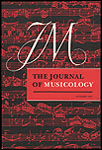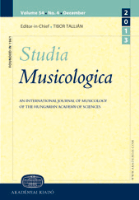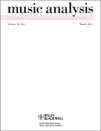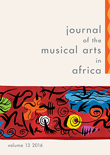
MUSIKFORSCHUNG
Scope & Guideline
Fostering Critical Perspectives in Musicology
Introduction
Aims and Scopes
- Historical Musicology:
The journal emphasizes the historical development of music, exploring significant composers, works, and musical practices across different eras, with a particular focus on German music history. - Music Theory and Analysis:
A core focus of MUSIKFORSCHUNG lies in the theoretical analysis of music, including studies on form, structure, and the evolution of music theory from the Middle Ages to contemporary practices. - Ethnomusicology and Cultural Studies:
The journal includes research on ethnomusicology, examining the social and cultural contexts of music, particularly how music interacts with identity, politics, and society. - Interdisciplinary Approaches:
MUSIKFORSCHUNG encourages interdisciplinary research, integrating perspectives from fields such as philosophy, sociology, and cultural studies to enrich musicological discourse. - Performance Practice and Interpretation:
The journal features studies on performance practice, addressing how historical performance contexts influence contemporary interpretations of classical works.
Trending and Emerging
- Digital Humanities and Music:
There is an increasing trend towards integrating digital humanities into musicology, with studies exploring the impact of digital tools and platforms on music research and dissemination. - Gender and Music Studies:
Recent articles have increasingly addressed gender dynamics within music, examining the roles and representations of women in music history and contemporary practices. - Global Music Perspectives:
Emerging themes include a focus on global music practices, exploring transcultural exchanges and the impact of globalization on musical traditions and identities. - Music and Politics:
The intersection of music and politics has gained significant attention, with research investigating how music serves as a tool for political expression and social change. - Music and Technology:
There is a growing interest in the relationship between music and technology, particularly in how technological advances influence composition, production, and consumption of music.
Declining or Waning
- Early Music:
Research specifically focused on early music, particularly from the Renaissance and Baroque periods, has seen a decline, possibly due to a shift towards more contemporary and modern musicological studies. - Traditional Music Education:
There has been a noticeable waning of articles centered around traditional music education methods, reflecting a broader trend towards exploring innovative and alternative music teaching practices. - Regional Music Studies:
The focus on localized music studies, such as specific regional traditions outside of Europe, has become less prominent, indicating a potential shift towards global and transnational music research.
Similar Journals

Musicologist
Connecting Theory, History, and Practice in MusicologyMusicologist is a premier academic journal dedicated to the exploration and analysis of music theory, history, and practice, published by the esteemed Trabzon University State Conservatory in Turkey. With an ISSN of 2618-5652, this journal has been a vital platform for scholars since its inception in 2019, reflecting a commitment to fostering innovative research in the field of music. Recognized for its quality, the journal currently holds a Q2 ranking in the music category for 2023, placing it within the top segments of its discipline, as evidenced by its position at #72 out of 180 in the Scopus rankings, representing the 60th percentile. Although the journal employs a traditional publication model, it serves as a crucial repository for contemporary musicological discourse, aiming to advance knowledge and understanding within a vibrant academic community. Musicologist is not only a resource for seasoned researchers but also an invaluable tool for students and professionals alike, nurturing a comprehensive appreciation of music as an art form and scholarly pursuit.

REVUE DE MUSICOLOGIE
Nurturing the Future of Musicological ScholarshipREVUE DE MUSICOLOGIE is a prominent academic journal dedicated to the diverse field of musicology, published by EDITIONS TRANSATLANTIQUES in France. With an ISSN of 0035-1601, this journal has been a key platform for researchers and scholars since its inception, fostering scholarly discourse and advancing the understanding of music's cultural, theoretical, and historical dimensions. Although it currently holds a Q4 category in Music according to the 2023 quartiles and is ranked #140 in the Scopus Arts and Humanities Music category, REVUE DE MUSICOLOGIE continues to publish valuable insights that contribute to the global musicological landscape. The journal does not offer open access, adhering to standard subscription models. Its primary objective is to provide a rigorous forum for original research articles, reviews, and theoretical discussions, making it an essential resource for academics, professionals, and students in the field of musicology. Located at 50 RUE JOSEPH DE MAISTRE, 75018 PARIS, FRANCE, it promises to remain a vital part of music research through 2023 and beyond.

Muzikoloski Zbornik
Championing Open Access in Music ScholarshipMuzikoloski Zbornik is a prominent open-access journal in the field of musicology, published by the esteemed University of Ljubljana Press since 1965. Hailing from Slovenia, this journal has been dedicated to advancing the study of musical heritage, theory, and practice, serving as a vital platform for researchers, professionals, and students alike. With a notable Q2 category ranking in the field of music and a Scopus ranking of 109 out of 180 in Arts and Humanities, Muzikoloski Zbornik showcases high-quality research, fostering discourse and collaboration among scholars globally. The journal embraces a diverse range of topics, from ethnomusicology to music education, ensuring its relevance in an ever-evolving academic landscape. By providing unrestricted access to its content, it champions the dissemination of knowledge and supports the growth of the musicology discipline.

JOURNAL OF MUSICOLOGY
Exploring the Depths of Musical ScholarshipJOURNAL OF MUSICOLOGY, published by UNIV CALIFORNIA PRESS, stands as a premier academic forum for the exploration and dissemination of research in the field of musicology. With an ISSN of 0277-9269, this journal provides a vital platform for scholars, practitioners, and educators to engage with contemporary and historical music studies. The journal, which has been publishing significant works since 1982 and continues through to 2024, boasts a commendable Q2 ranking in Music and holds a notable position within the 68th percentile of Scopus rankings for Arts and Humanities, specifically in Music. Although it does not offer open access, the journal remains a crucial resource for those dedicated to advancing the understanding of musical heritage, theory, and practice. The JOURNAL OF MUSICOLOGY aims to foster interdisciplinary dialogue and promote innovative methodologies within the field, thereby making it an essential read for all engaged in the scholarly pursuit of music.

Musica Oral del Sur
Advancing Scholarship in Oral Musical PracticesMusica Oral del Sur is a prominent academic journal published by the Junta Andalucía through the Centro Documentación Musical Andalucía. With its ISSN 1138-8579 and E-ISSN 2445-0391, this pioneering publication has championed open access since 1995, providing a vital platform for scholars dedicated to the exploration of traditional and contemporary oral music practices in Southern Spain and beyond. The journal is essential for researchers, professionals, and students interested in musicology, ethnomusicology, and cultural studies, promoting scholarly discourse through a rich assortment of articles, reviews, and field research. Set in the vibrant cultural landscape of Granada, the journal encourages the fusion of theoretical insights with practical implications, making significant contributions to the understanding of oral musical traditions. By fostering accessible academic dialogue, Musica Oral del Sur plays an invaluable role in preserving and highlighting the heritage of Southern musical expressions while addressing contemporary issues in the field.

Problemy Muzykalnoi Nauki-Music Scholarship
Cultivating a Global Dialogue on Music ScholarshipWelcome to Problemy Muzykalnoi Nauki-Music Scholarship, a leading journal in the field of music scholarship published by the esteemed Gnesin Russian Academy of Music. With an ISSN of 2782-358X and an E-ISSN of 2782-3598, this Open Access journal has been committed to the dissemination of high-quality research since 2009, making scholarly work accessible to a global audience. Covering diverse aspects of music theory, history, and its socio-cultural impacts, Problemy Muzykalnoi Nauki serves as an essential platform for scholars, educators, and practitioners in the arts and humanities, as well as in social sciences related to music education. While its Scopus coverage was discontinued in 2021, the journal remains influential, holding a rank of #48 in the Arts and Humanities category and a percentile of 67th, showcasing its relevance and rigor in the discipline. We invite researchers and students alike to explore the rich contributions made within these pages, fostering a deeper understanding and appreciation of music in contemporary society.

Studia Musicologica
Cultivating Knowledge in the Art of MusicologyStudia Musicologica, published by AKADEMIAI KIADO ZRT, stands as a leading journal in the field of musicology, dedicated to the exploration and analysis of music across diverse cultures and historical contexts. With its ISSN 1788-6244 and E-ISSN 1789-2422, this journal provides an essential platform for disseminating high-quality research and critical analyses, thereby contributing significantly to scholarly discourse in music studies. Although it operates on a traditional access model, its rigor and foundational contributions ensure that it remains invaluable for researchers, professionals, and students alike. Situated in the heart of Hungary, Studia Musicologica engages with a broad spectrum of topics including music theory, ethnomusicology, and music history, fostering a deeper understanding of music's multifaceted role in society. This makes it an essential resource for anyone interested in advancing their research or professional practice within the expansive field of musicology.

MUSIC ANALYSIS
Deciphering the Language of Music through AnalysisMUSIC ANALYSIS, published by WILEY, is a prestigious journal in the field of musicology, recognized for its critical contributions to the analysis of music and its myriad influences on culture and society. With an ISSN of 0262-5245 and an E-ISSN of 1468-2249, this journal has established itself as a vital resource for researchers, professionals, and students alike, boasting a Q1 ranking in the 2023 category of Music. As part of a highly competitive field, it ranks 70th out of 180 in the Arts and Humanities Music category on Scopus, positioning it within the 61st percentile. MUSIC ANALYSIS serves as an essential platform for innovative research and insightful discourse, engaging with musical theory, practice, and education from 1996 to 2024. Its commitment to fostering rigorous scholarship makes it indispensable for those seeking to deepen their understanding of music and its analytical frameworks. Although it does not offer Open Access options, its relevance and impact in the genre ensure accessibility through institutional subscriptions and university libraries.

HUDEBNI VEDA
Celebrating the Art and Science of MusicHUDEBNI VEDA is a distinguished journal published by the Czech Academy of Sciences Press, specializing in the field of music. With its ISSN 0018-7003 and E-ISSN 2694-6998, this journal serves as a vital platform for scholarly communication in music studies, promoting innovative research and critical discourse. Since its inception in 2002 and scheduled for continuation until 2024, it has emerged as a respected publication within the music academic community, though currently holding a Category Quartiles ranking of Q4 in Music. Notably, it ranks #127 out of 180 in the Scopus Arts and Humanities - Music category, placing it in the 29th percentile. While it operates under traditional access constraints, HUDEBNI VEDA is committed to fostering an inclusive academic environment, inviting contributions that push the boundaries of musicology. This journal is essential for researchers, professionals, and students eager to explore and engage with contemporary issues and developments in the study of music.

Journal of the Musical Arts in Africa
Celebrating the Symphony of African HeritageThe Journal of the Musical Arts in Africa is a premier academic publication dedicated to exploring the rich and diverse musical traditions of the African continent. Published by ROUTLEDGE JOURNALS, TAYLOR & FRANCIS LTD, this journal offers a vital platform for researchers, professionals, and students in the field of musicology. With an ISSN of 1812-1004 and E-ISSN of 2070-626X, the journal has established itself as a significant contributor to the scholarly discourse surrounding African musical practices. With an impact factor reflecting its growing influence, the Journal of the Musical Arts in Africa is categorized in the Q3 quartile of music journals according to the latest metrics, placing it among an essential cadre of publications in the field. The journal invites original research articles, reviews, and critical essays that aim to expand the understanding of music as an integral part of African culture. It has been continuously publishing since 2004 and encompasses a wide range of topics, making it a must-read for anyone interested in the intersections of music, culture, and identity on the African continent. The journal stands as a testament to the vibrant musical heritage of Africa and encourages scholarly contributions that highlight the importance of music in reflecting and shaping societal values.